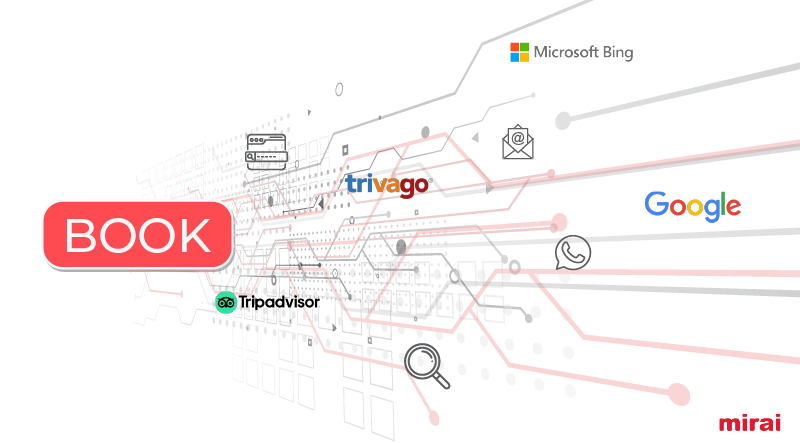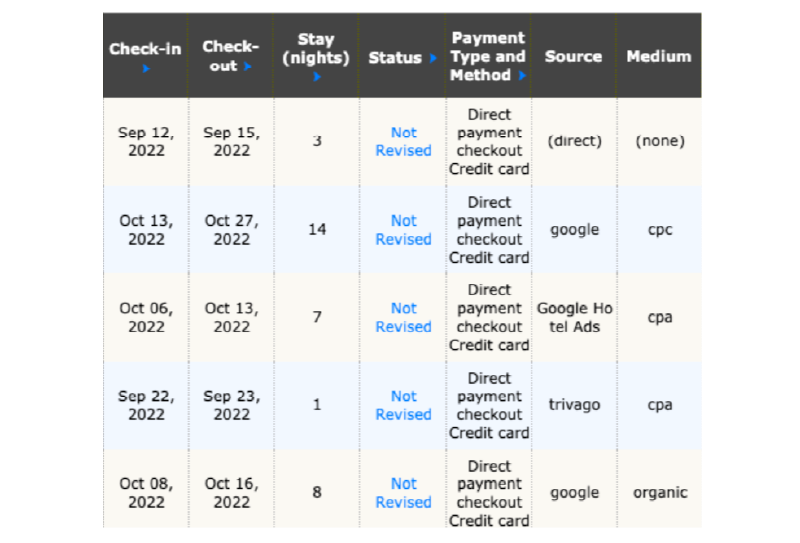En español, en français, em português.
Information is power and time is money, so the ability to extract and analyse data with immediacy is becoming more and more important. From an operational point of view, “where a booking comes from” is not very relevant. However, from a marketing point of view, it is vital information that allows us to effectively evaluate the performance of our efforts to position our website on the different free and paid storefronts.
The source or origin of a booking, better known as booking attribution, is highly sought after and automating the collection of this information is becoming more and more essential. At Mirai, we always used to report this information with every booking, but we stopped doing so due to the complexity of extracting the data accurately. It was not a loss as the data has always been in Google Analytics, which reliably identifies how customers arrive at your website, as well as those who end up making a booking. The information was not lost, but having it decoupled from your reporting system (booking engine or channel manager), was a nuisance.
From today, we will now provide accurate and reliable information on the source and medium for every booking in all reports on our extranet and, very soon, on our BI platform.
But what is the source and medium of a booking and what is its purpose?
We have transcribed, with a few additional comments, the description provided by Google for each one:
- Source: the origin of your traffic, such as a search engine (for example, Google or Tripadvisor) or a domain that links to your website (example.com).
- Medium: the general category of the source, for example, organic search (organic), cost-per-click paid search (CPC), web referral (referral).
Having an aggregate view of the source and medium for all your website sales allows you to understand much more about where the traffic to your website is coming from. It gives you a clearer view of the conversion funnel and allows you to identify those who are providing you with the traffic that ends up purchasing your rooms. Having this information helps you to pinpoint opportunities to drive more traffic to your website by leveraging those sources (or storefronts) that have a lot of customers but drive little traffic to your website.
What are the most relevant sources and mediums?
The most important and common sources are:
- Search engines such as Google, Yahoo and Bing.
- Metasearch engines such as Tripadvisor, trivago, Kayak and Google Hotel Ads.
- Domains with links to your website such as blogs, travel and hotel websites (referral traffic).
- Direct traffic to your website (without passing through anywhere else first).
- Email marketing usually labelled as a newsletter.
The most significant mediums are:
- Organic: organic or non-paid results in a search engine, for example. Free booking links are organic entries from Google Hotel Ads.
- CPC: paid traffic on a cost-per-click basis.
- CPA: paid traffic on a cost-per-acquisition or commission basis.
- Referral: traffic that comes from domains linking to your website.
As well as any combination of source/medium, for example, Google/organic, Trivago/CPA or Google Hotel Ads/organic.
Apart from these standard values, each hotel can tag the traffic coming to its website by customising the values of the source and medium variables. For example, you can label traffic from social media as social/Facebook or Instagram/ads or traffic coming from the hotel Wi-Fi network as direct/Wi-Fi.
Where does Mirai get the source and medium for each booking from?
At Mirai, we have full traceability as to whether bookings are from a website, contact centre, corporate, agency or generated by a storefront such as a metasearch engine. From now, we will also incorporate the source and medium information into each booking by integrating with Google Analytics via API and downloading the corresponding data.
Every evening, we will query Google Analytics for all bookings from the previous day and feed the source and medium allocated by Google into our system.
From then on, this information will be available on all listings and reports on our extranet.
- Booking lists.
- Details for each booking.
- Download of bookings in Excel.
- We will soon incorporate these new variables into our BI platform, which will allow you to segment your hotel or chain sales by source and medium and cross-reference them with variables such as mobile, room type, occupancy and source market. This provides you with many new ways to understand your direct sales and growth opportunities.
Is it compatible with all versions of Google Analytics?
It is only compatible with Google Analytics 4, not older versions (Universal or asynchronous). You should be aware that Google has decided to stop supporting the Universal version on 1 July 2023 and so we have decided to only implement this integration with Google Analytics 4.
If you have your website with Mirai, don’t worry, it is highly likely that your website has already been migrated to Analytics 4. If not, please contact your account manager.
If you have the website with another company, you should arrange the migration to Analytics 4 through them. Your account manager can help you do this, or even do it for you, but it will depend on the permissions granted by the company that manages your website.
What is the attribution model for bookings?
Google Analytics has different ways of attributing a source and medium to a booking. Until the Universal version, the default attribution model was “last non-direct click” or, in other words, the last source to generate access to your website was attributed that booking. From Google Analytics 4 onwards, the attribution model has changed radically and is now called “data-driven attribution”, which distributes bookings more evenly according to the weight of each source or point of contact.
There are additional attribution models in Google Analytics that you can configure and change the views. They are all equally valid as they simply convey the same information from different angles.
What are the advantages of this system over others?
The standard way for other booking engines is to record the source and medium of the bookings by means of markers on links (e.g. www.domain.com/?trace=XXX), which are carried throughout the booking process (in the URL itself or via a cookie) and identify the bookings, attributing them to an initial source.
These systems work but have several problems:
- Inconsistency with Google Analytics. Undoubtedly one of the biggest problems for marketers is that the information does not match the information from Google Analytics. The reason is none other than the attribution model. In a markers system, the attribution is usually the duration of the cookie, which is often 30 days. Analytics, on the other hand, has its own (more precise and constantly evolving) mechanisms. These inconsistencies are inconvenient, generate a lot of uncertainty and complicate proper analysis.
- They only record part of the traffic and are therefore incomplete. They only mark paid traffic (digital marketing actions such as Google Ads or Meta Ads). The rest of the traffic comes unmarked and is therefore labelled as “other”, mixing direct traffic, referral (websites that link to your website) and organic traffic from Google (non-paid traffic in Google’s organic results). This is fundamental information that you miss out on.
- They are not cross-device. The path to a booking can be very convoluted and it is increasingly common for a user to be browsing the same booking on different devices. With a marker system, cross-device traceability doesn’t exist. One of the great advantages of Google Analytics 4 is its power to track traffic and conversions from different devices.
- They may not work on browsers that restrict cookies such as Safari or Firefox. Google has announced that it will stop supporting third-party cookies on Chrome in 2024.
The system we have developed at Mirai to extract source and medium:
- Is consistent with Google Analytics.
- Reports all bookings, including non-paid methods.
- Ensures multi-device tracking as it is supported by Analytics 4.
- Is compatible with hotels that have two websites, one individual and one corporate, as it will connect both to Analytics and search for the source and medium of the website that registered the booking.
- Will continue to work even if the browser does not support cookies as Google Analytics 4 is designed to work in this way.
I’m interested. What do I need to do?
Two things:
- Make sure you have Google Analytics 4 installed on your website.
- Ensure that Mirai has read access to the Google Analytics API. Coordinate with your account manager and they will explain how to do this.
Once again, if you have your website with Mirai you don’t need to worry.
However, if you have any questions, ask your account manager and they will be happy to help.







